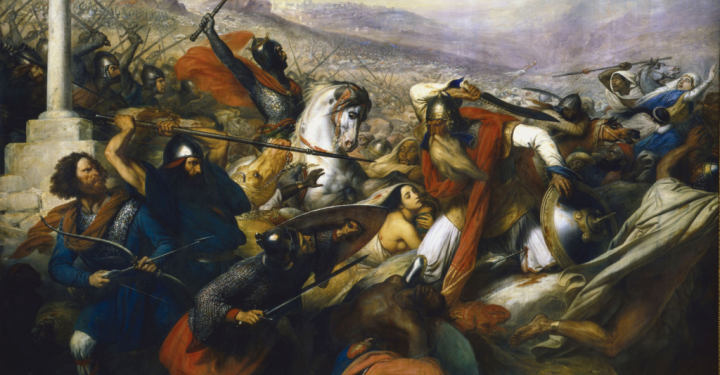
In a recent article for Cicero, Forest Grace claimed that monotheistic Western religions (which he defined as Islam, Judaism and Christianity) are inherently more violent than Eastern, polytheistic ones (specifically, Buddhism, Taoism and Hinduism). His is the faint echo of a very old argument – an argument made even fainter by its irrelevance in 2015.
Virtually every major religion, both Eastern and Western, has indulged in periods of religiously motivated violence. I would not contest that most religiously-motivated violence in the world currentlycomes from the Abrahamic religion of Islam, but it has not always been so, nor will it be so forever. The Spanish Inquisition had its day, as did the Taoist Emperor Wuzong who persecuted both Buddhists and monotheists to the point that neither ever recovered their prior popularity in China. (And it’s worth mentioning that, by confining himself to “major” religions, Grace conveniently avoids the tricky issue of, say, Shintoism which reached its zenith as the motivational religion behind the Japanese effort in WWII.)
But, to traffic a bit in the article’s generalities, I agree that Western religions are, historically, more aggressive than Eastern ones (Hinduism, however, while Eastern, can be interpreted as more monotheistic than polytheistic); I would only counter that Eastern religions are, on whole, more passivethan Western ones. Is this a good thing? Unlike Grace, I don’t find passivity to be a nobler trait than aggression. The religious failures of abject passivity are comparable to the sins of rabid aggression. Both aggression and passivity can lead to evil acts and inhumanity, if taken too far.
Why not focus on Islam and atheism?
The article’s focus on monotheism borders on tunnel vision, blinding its author to the far-greater role geography and politics played in the formations and evolutions of both Eastern and Western religions. Eastern religions thrived in countries, such as China, India and Japan, where formidable natural boundaries and the iron hands of their rulers kept the population insulated from outside religious influence or, at the minimum, helped staunch religiously motivated violence from bleeding across political boundaries. Western religions, in contrast, were forged in the crowded, turbulent furnaces of the Middle East and Europe, subject to ever-changing political boundaries, dynamic cultures and radical demographic changes. In that context, is it so surprising that Western religions developed a pugnaciousness that was less seen in the East?
By lumping all the Abrahamic religions together, the author ignores that each one has undergone wildly different and distinct transformations en route to the 21st century.
Yet, for all that pugnaciousness, the last time the Christian churches lobbied for war was in 1618. The article’s pontifications about Western religious violence seem quaint in 2015 when Hindu terrorists in India or Buddhist terrorists in Myanmar or Sri Lanka are as much a threat to the world as the Christian Lord’s Resistance Army or the Jewish Defense League. Grace would have argued from a firmer basis had he limited his critique to that of the radical forms of Islam which present the gravest religious threat to the world today. By lumping all the Abrahamic religions together, the author ignores that each one has undergone wildly different and distinct transformations en route to the 21st century. No one disputes that the Crusades were often fueled by radicalized religious fervor. But so what? The last Crusade was in 1487. It might be more relevant to ask why we shy away from unequivocally condemning that same radicalization today when it comes from the darker corners of Islam?
Instead, Grace furthers his argument by referencing Mark Twain and touting not “mere tolerance,” but “indifference” to organized religion. Whether or not this is an endorsement of atheism is left ambiguous. However, it is rich that, in an article referencing religiously motivated violence going back one thousand years, Grace fails to note that most violence over the past 100 years has not stemmed from any organized religion, but, in fact, from devout atheism.
Does violence stem from monotheism or theocracy?
The article argues that belief in a “true” God is “not a good enough reason to kill, let alone to die for.” If only the polytheistic Roman government that crucified Jesus had felt that way. To avoid such a clear example of the violent suppression monotheism suffered at the hands of polytheism, is curious. Instead, Grace seems tempted to equate the actions of nation states with those of organized religion, making the leap to link George W. Bush’s Christianity to the U.S. response to 9/11. Is Grace also willing to link Thai Prime Minister Prayut Chan-o-cha’s Buddhism to the governance of his tyrannical junta? Or is Grace’s fundamental problem really with Western culture and foreign policy? If so, Grace is left only with an argument against theocracy, not monotheism; Iran presents a far greater threat to global peace than does the Vatican.
The author’s arguments are selective, myopic and illogical. Rather than camouflaging Islam’s burgeoning extremism under the umbrella of Abrahamic religions and wringing his hands over the historical violence of Western religions, Grace would be better served by examining how religions, whether Eastern or Western, have labored to achieve peace in their ranks. How have Protestants, Catholics, Buddhists and Hindus dealt with their own extremists? What lessons can be applied to modern-day Islam – a religion that, if not inherently prone to violence, possesses a sizeable number of adherents who would appear to be woefully misinformed as to Islam’s true, peaceful nature? I’m not an Islamic scholar; I can only ask questions. It would be nice if writers such as Grace put their efforts towards giving us answers.
[Photo: The Battle of Tours (732), Bataille de Poitiers by Charles de Steuben (1837)]


Without placating favoritism to one author or an other, I should think that the foundations of the USA deserves some recognition. I am referring to the Gnosticism of the founding signatories of the Constitution. Sometimes referred to as Freemasons. Many have argued that the first immigrants from the Old World were a band of Templars escaping the mandated merger of the Vatican that sought to ajoin the Templars with the Hospitaliers. Of the same boat load it has been asserted that there were Muslim and Christian alike seeking freedom from church oppression.
I find there has been recently a sharp tangent departing from our founding,principles. I am referring to the Bush doctrine of “Faith based initiatives”. Then the current POTUS has stuck his own theology with billions to religious lapels such as the Muslim Brotherhood, of which the ISIL is the fostered child of.
Posturing any religion by Official State policy demeans and degrades all other beliefs.
I saw something like a couple of weeks ago, but you did in-depth research, and
your post appears to be much more compelling than the others.
I’m impressed by the arguments you supplied as well as the
kind of your article. I enjoy when articles are both informative and interesting, when even boring facts are presented in an interactive manner.
Well, it is surely on your article.
It is apparent that the author is a statistics geek. I enjoy how he writes and writes facts.
It is always such a pleasure to read posts made by actual professionals.
I’m fed up with that no-name, ghostwritten articles.
That’s why it was so good to look at a persuasive piece.
I visit the writer has ground knowledge it the subject as well as some practical experience.
Such kind of information is more precious than copypasted blog
posts ideas.